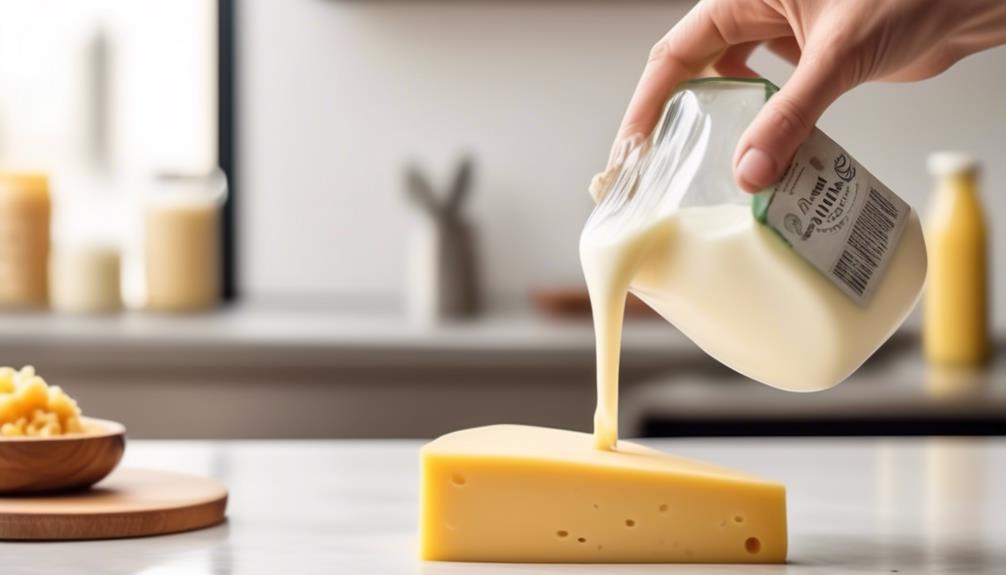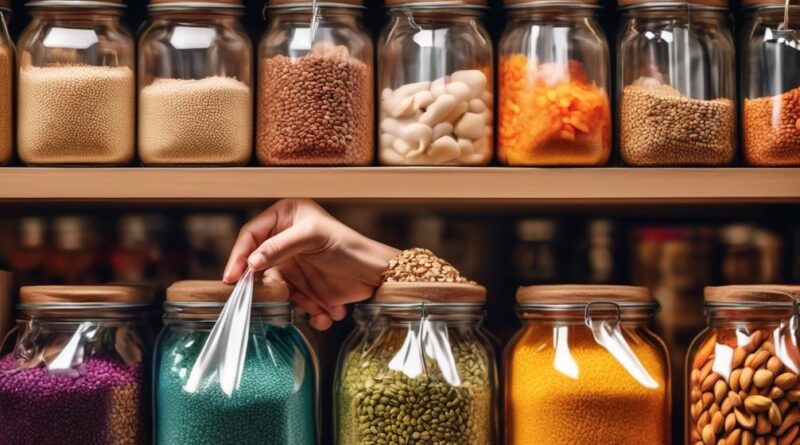What Are the Top Zero Waste Grocery Options?
Did you know that the average person generates over 4 pounds of trash per day?
If you're looking to reduce your environmental impact, you may be interested in exploring zero waste grocery options. From bulk bin shopping to package-free produce, there are numerous ways to minimize packaging and waste when it comes to your grocery shopping.
But where do you start, and what are the top zero waste grocery options available to you? Let's explore some of the most effective and sustainable ways to shop for groceries without contributing to landfill waste.
Bulk Bin Shopping
When shopping in bulk bins, you can reduce packaging waste by bringing your own reusable containers. This simple action not only minimizes the need for single-use plastic bags or containers but also helps in reducing food waste. By using your own containers, you can take just the amount of food you need, which can lead to less food spoilage and ultimately less waste.
Additionally, bulk bin shopping allows you to choose sustainable packaging alternatives. Many bulk foods are available without any packaging at all, while some stores offer compostable or recyclable paper bags. Opting for items with minimal or eco-friendly packaging can significantly reduce the environmental impact of your grocery shopping.
When you bring your own containers, you're actively participating in the effort to reduce the amount of plastic and other packaging materials that end up in landfills. This small change in your shopping habits can make a big difference in the long run. Moreover, by purchasing only the quantities of food you need, you can minimize the likelihood of food going bad before you have a chance to use it, thus contributing to the reduction of food waste.
Embracing bulk bin shopping not only aligns with a zero-waste lifestyle but also promotes sustainability by encouraging the use of sustainable packaging options.
Refill Stations
To further reduce packaging waste and continue your journey toward zero waste grocery shopping, consider utilizing refill stations for household and personal care products. Refill stations offer a convenient way to access a wide range of products in a sustainable manner.
Here are some key points to consider when using refill stations:
- Refillable containers
When using refill stations, you can bring your own refillable containers to fill up with products such as laundry detergent, dish soap, shampoo, and various household cleaners. This helps to significantly reduce single-use plastic and packaging waste, while also promoting the reuse of containers.
- Local sourcing
Many refill stations partner with local suppliers and producers to source their products. By supporting refill stations that prioritize local sourcing, you can contribute to the reduction of carbon emissions associated with transportation and support local businesses within your community.
When utilizing refill stations, it's important to ensure that the containers you bring are clean and suitable for refill. Additionally, some refill stations may offer a discount or loyalty program for customers who bring their own containers, further incentivizing sustainable practices.
Farmers' Market Finds
One of the best ways to discover fresh, locally grown produce and unique artisanal goods is by exploring the offerings at your nearest farmers' market. When you visit, be sure to seek out local honey, a delightful treat that not only tastes exquisite but also supports local beekeepers and helps sustain the bee population. Local honey is often raw and unfiltered, retaining more of its natural nutrients and flavors compared to commercially processed honey. It's a versatile ingredient that can be used in cooking, baking, or simply enjoyed on its own.
In addition to local honey, farmers' markets are also a great place to find seasonal flowers. These blooms aren't only gorgeous and fragrant but also eco-friendly, as they haven't been shipped from distant locations. Seasonal flowers contribute to the biodiversity of the area and can be composted after use, making them a sustainable choice for brightening up your home or giving as a thoughtful gift.
As you browse through the stalls, take the time to chat with the vendors. They can provide valuable information about the products they offer, including how they were grown or made. By purchasing from farmers' markets, you're supporting local producers and reducing the carbon footprint associated with transporting goods over long distances.
Package-Free Produce
As you explore the farmers' market for local honey and seasonal flowers, consider seeking out package-free produce options to further reduce waste and support sustainable practices.
When it comes to package-free produce, there are several options to consider, each with its own benefits:
- Local Sourcing
- Look for local farms and vendors that offer package-free produce. By buying locally sourced fruits and vegetables, you can reduce the environmental impact of transportation and support your community's economy.
- Consider joining a community-supported agriculture (CSA) program, where you can receive a regular supply of fresh, package-free produce directly from local farms.
When it comes to sustainable packaging, opting for package-free produce is a great way to minimize waste. By choosing fruits and vegetables without plastic packaging, you can significantly reduce the amount of single-use plastic in your grocery routine.
Additionally, many farmers' markets and local vendors prioritize sustainable practices, such as using compostable or reusable containers for their produce. By supporting these businesses, you can contribute to the reduction of plastic pollution and promote environmentally friendly packaging alternatives.
Zero Waste Bakery
Have you considered exploring zero waste bakery options to reduce your environmental impact and support sustainable food practices? Sustainable pastries and waste reduction are at the forefront of zero waste bakeries. When seeking eco-friendly bread and packaging alternatives, there are several options to consider.
Many zero waste bakeries prioritize using locally-sourced, organic ingredients to create their sustainable pastries. By doing so, they not only support local farmers and reduce carbon emissions from transportation but also ensure that the ingredients used are free from harmful pesticides and chemicals. Additionally, these bakeries often implement practices such as composting food scraps and using energy-efficient equipment to further minimize waste and reduce their environmental footprint.
In terms of packaging alternatives, zero waste bakeries often encourage customers to bring their own reusable containers when purchasing bread, pastries, and other baked goods. Some establishments also offer products wrapped in compostable or biodegradable packaging, which significantly reduces the amount of single-use plastic and non-recyclable materials typically associated with traditional bakery items. Moreover, some zero waste bakeries have implemented innovative practices such as a container exchange program, where customers can return clean, empty containers to be reused, further contributing to waste reduction efforts.
Sustainable Seafood
Exploring sustainable seafood options can lead to more environmentally friendly and ethically sourced dining choices. When choosing sustainable seafood, you're supporting ocean-friendly sourcing practices and contributing to the reduction of seafood waste. Here are some key points to consider when making sustainable seafood choices:
- Sustainable Fishing
- Look for labels like Marine Stewardship Council (MSC) or Best Aquaculture Practices (BAP) to ensure that the seafood has been sourced sustainably.
- By choosing sustainably caught or farmed fish, you're supporting the conservation of marine ecosystems and helping to preserve fish populations for the future.
- Ethical Sourcing
- Opt for seafood that has been sourced using methods that minimize harm to the environment and other marine life.
- By selecting seafood that's ethically sourced, you're making a positive impact on marine conservation efforts and promoting responsible fishing practices.
When you prioritize sustainable seafood options, you're contributing to the protection of our oceans and marine life. Sustainable seafood not only helps to combat overfishing and reduce environmental impact but also supports the livelihoods of fishermen who follow responsible fishing practices.
Plastic-Free Dairy

Consider seeking out plastic-free dairy options to reduce your environmental impact and support sustainable packaging practices. When shopping for dairy products, look for options that come in glass bottles or compostable packaging. Many dairy items traditionally come in plastic containers, contributing to the global plastic pollution crisis. By choosing plastic-free alternatives, you can play a part in reducing plastic waste and supporting eco-friendly packaging solutions.
Opting for dairy products in glass bottles is a great way to minimize your plastic usage. Glass bottles are reusable and recyclable, making them a sustainable choice for packaging dairy items like milk, yogurt, and cream. After enjoying your dairy products, you can return the glass bottles to the store for them to be cleaned and refilled, reducing the need for single-use plastic containers.
Additionally, look for dairy products that are packaged in compostable materials. Compostable packaging breaks down into natural components when disposed of properly, reducing the environmental impact compared to traditional plastic packaging. This way, you can enjoy your favorite dairy products while knowing that the packaging won't contribute to the accumulation of plastic waste in landfills and oceans.
Eco-Friendly Pantry
When organizing your pantry for eco-friendly practices, prioritize storing bulk goods in reusable containers to minimize single-use packaging waste. Using reusable containers not only reduces the amount of plastic and paper waste but also keeps your pantry organized and aesthetically pleasing.
Here are some strategies for creating an eco-friendly pantry:
- Choose the Right Containers
Opt for glass, stainless steel, or BPA-free plastic containers to store your bulk goods. These materials are durable, reusable, and can help extend the shelf life of your pantry items.
- Label and Organize
Use reusable labels or chalk markers to clearly mark the contents and expiration dates of your pantry items. Organizing your pantry effectively can help reduce food waste and prevent items from getting lost or forgotten.
Frequently Asked Questions
How Can I Reduce Food Waste When Shopping at These Zero Waste Grocery Options?
When shopping at zero waste grocery options, you can reduce food waste by bringing reusable containers and bags, buying in bulk, and planning meals to use all ingredients. Sustainable shopping habits help minimize waste and benefit the environment.
Are There Any Specific Tips for Storing Bulk Bin Items to Keep Them Fresh Longer?
To keep bulk bin items fresh longer, use airtight containers and store in a cool, dark place. Keep moisture out to prevent mold and spoilage. Label and rotate items to use older ones first. These tips help maintain freshness.
What Are Some Creative Ways to Repurpose Packaging From Non-Zero Waste Items?
When repurposing packaging, get creative! You can turn non-zero waste items into useful storage or craft materials. By finding resources and encouraging stores to reduce waste, you'll contribute to a more sustainable lifestyle.
Are There Any Resources or Apps Available to Help Me Find Zero Waste Grocery Options in My Area?
Looking for zero waste grocery options in your area? Check out resources and apps to support your sustainable living strategies. Embracing a zero waste lifestyle is easier with these tools that help you find eco-friendly shopping choices.
How Can I Encourage My Local Grocery Store to Offer More Zero Waste Options?
To encourage your local grocery store to offer more zero waste options, start with community outreach and sustainability initiatives. Show consumer demand and suggest supplier partnerships. Engage with the store manager and provide constructive ideas for positive change.
Conclusion
So, next time you're grocery shopping, remember to look for bulk bins, refill stations, and farmers' markets for zero waste options.
Choose package-free produce, visit a zero waste bakery, and opt for sustainable seafood and plastic-free dairy.
And don't forget to stock your pantry with eco-friendly options.
By making these simple changes, you can reduce your environmental impact and contribute to a more sustainable future.
Happy zero waste shopping!
